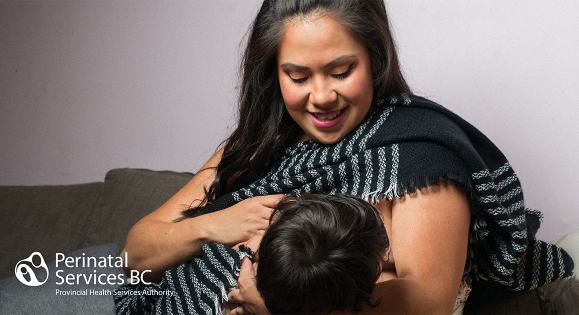PHSA recognizes and supports any employee's right to engage in activities that support human milk feeding (also known as breastfeeding, chestfeeding, expressing milk, or nursing) on PHSA premises anytime and at any location. Human milk is important for wellness, and is also the first traditional food for infants. PHSA will make all reasonable efforts to provide safe, appropriate and convenient spaces for employees to support human milk feeding.

Susan Anthony and Kayla Hofman work together in the Workforce Strategies team within People and Culture. As the director of Workforce Planning, Susan ensures PHSA has people policies in place to support employees. Kayla, a policy analyst, works with partners to ensure the People and Culture policies are culturally safe, inclusive and accessible to all staff.
Susan and Kayla were recently asked to develop PHSA Human Milk Feeding (breastfeeding, chestfeeding and expressing milk) guidance for staff and leaders. The information outlines steps to support human milk feeding in the workplace. For Susan and Kayla, the subject felt personal.
 A few decades ago, when Susan gave birth to her daughter, parental leave rules at the time meant she didn’t qualify for paid leave, and daycares wouldn’t take newborns. Susan had to get back to work, but breastfeeding her daughter became a challenge."Pumping breast milk was a very new idea and, truthfully, it never really crossed my mind," said Susan. "Back then, there was no real support for feeding after you left the hospital."
A few decades ago, when Susan gave birth to her daughter, parental leave rules at the time meant she didn’t qualify for paid leave, and daycares wouldn’t take newborns. Susan had to get back to work, but breastfeeding her daughter became a challenge."Pumping breast milk was a very new idea and, truthfully, it never really crossed my mind," said Susan. "Back then, there was no real support for feeding after you left the hospital."
 Kayla is expecting her first child in February and hadn't considered what returning to work after parental leave would look like.
Kayla is expecting her first child in February and hadn't considered what returning to work after parental leave would look like.
"Once we began this work, I started discussing the topic with both my coworkers and individuals in my personal life," said Kayla.
I believe everyone should have the ability to return to work and feed their newborn in the way that suits them best, and I am so glad that PHSA is working to support and accommodate individuals who are breastfeeding, chestfeeding or expressing their milk."
The global recommendation for breastfeeding or chestfeeding is two years, but for many individuals it's not an option due to work schedules and demands. Many people may also not be aware that breastfeeding or chestfeeding anywhere is a human right. The good news is that more workplaces are creating an enabling environment for parents who breastfeed or chestfeed and express milk at work – and PHSA is one of them.
Whether an employee is planning to go on maternity or parental leave or at the stage of planning to return to work, the PHSA Human Milk Feeding guidance information provides steps employees can follow to support continued feeding, including:
- Having a conversation with their manager before returning to work to discuss their right to breastfeed or chestfeed and express milk at work, including any accommodations needed around storing human milk
- Having a clean, comfortable and private space at work to express human milk
- Designating a section of the staff fridge for storing human milk
Follow these tips to create a lactation-friendly space in your workplace
For managers, the information outlines how they can support their employee who is returning to work. It also promotes employees' health and wellness, provides quality work-life balance, and increases overall engagement and morale.

"I'm very thrilled about the PHSA Human Milk Feeding guidance and grateful to Susan and Kayla for developing it so thoughtfully," said Lea Geiger, the provincial clinical coordinator Maternal Infant Health, with Perinatal Services BC (PSBC). "Their partnership has resulted in supportive return-to-work information that will have a far reaching impact to improve the health of our PHSA families."
Adds Susan, "I could not be more proud to support this for all our employees. We welcome all ideas for programs to support staff, but this one feels kind of personal. Doing this work definitely qualified as a great day in the office."
National Breastfeeding Week (October 1-7) is an opportunity to engage health-care providers and communities in a conversation about how to protect, promote and support breastfeeding or chestfeeding in B.C.
How can you support parents who continue breastfeeding, chestfeeding and expressing milk after returning to work?
- Breastfeeding or chestfeeding: PSBC
- Breastfeeding or chestfeeding at work: HealthLinkBC
